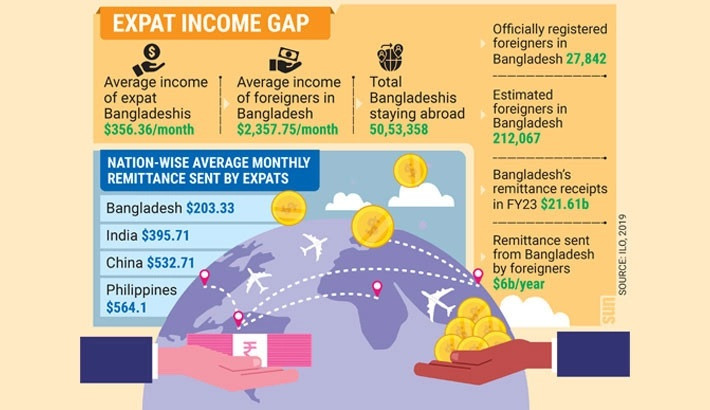Skills gap: A tale of opposite fortunes
Low-skilled Bangladeshis toil abroad for meagre pay while skilled foreigners in Bangladesh enjoy lucrative jobs
Published: 17 Dec 2023

A marked lack of skills in the Bangladeshi workforce is reportedly prompting different sectors to hire foreigners in key positions, posing a dual challenge for the nation’s foreign reserves.
Bangladeshi migrant workers are unable to earn higher remittances as most of them are engaged in low-skilled jobs. Conversely, different Bangladeshi companies are hiring foreign professionals at high salaries, leading to a huge outflow of foreign currency.
The income of Bangladeshi migrant workers residing abroad notably lags behind their counterparts from other nations, a disparity experts attribute to the skills gap.
Bangladeshi workers typically earn $200-400 per month while Indian expatriates earn double the amount, according to economists. On the other hand, foreigners working in Bangladesh earn $2,357.75 per month on average.
According to the Population and Housing Census 2022, some 27,842 individuals reported as foreigners in Bangladesh. Meanwhile, an intelligence agency’s special report on foreign nationals indicates that 212,067 foreigners were staying in Bangladesh as of 11 September 2022.
The analysis of visa statistics for 121,227 foreigners from seven countries revealed that 97,695 were overstaying their visas while 23,532 were staying with valid visas until then.
Collectively, foreigners working in Bangladesh earn approximately $6 billion in a year, as stated by an economist.
In contrast, a total of 50,53,358 Bangladeshi nationals are staying abroad, according to the Bangladesh Bureau of Statistics (BBS) report. Though the Bureau of Manpower, Employment and Training (BMET) said over 1.5 crore Bangladeshis have gone to different countries for employment since 1976, it does not maintain records on those have returned home permanently.
Dr Ahsan H Mansur, executive director of the Policy Research Institute of Bangladesh (PRI), asserted that the minimum figure of returnees stands at 50 lakh.
After a detailed analysis of data from Bangladesh Bank, BBS, BMET and experts, it can be said that around 50,53,358 Bangladeshi expatriates residing abroad and they contributed $21.61 billion to the country in fiscal year 2022-23, showing an individual income of about $356.36 per month on average.
Conversely, the number of foreigners residing in Bangladesh totals around 2,12,067, who are earning about $6 billion annually and remitting these funds to their home countries.
This stark contrast highlights a discernible shortage of skilled labour in the country and abroad. Bangladeshi expatriates, despite their significant contribution, earn substantially less than their counterparts from neighbouring countries, which underscores the urgent need for a strategic focus on skills development and enhancement initiatives to elevate the competency and earning potential of the Bangladeshi workforce.
Zeba Alam, a Bangladeshi expatriate in Italy, pointed out that a significant number of Bangladeshi workers are going abroad illegally, and most of them lack skills. Consequently, they end up working with whatever pay they receive, she added.
In contrast, workers from India, Pakistan, China and the Philippines mostly come legally, and a large portion of them possesses valuable skills. As a result, they tend to secure high-paying jobs, according to Zeba.
A recent BBS report highlights a wide gap in technical education representation in Bangladesh, accounting for only 0.81% of the total population aged five and above. This raises significant concerns among economists, pointing to potential challenges in cultivating a skilled workforce.
Presently, general education dominates, comprising 89.26% of the population aged five and above, with religious education at 7.19%, and other educational forms at 2.74%.
Dr Zahid Hussain, former lead economist of the World Bank’s Dhaka office, told the Daily Sun that Bangladesh grapples with a significant skilled manpower deficit in the domestic job market, prompting an annual expenditure of $4-6 billion to import skilled workers from countries like Sri Lanka, India and China.
The country faces a critical challenge in producing adequate skilled labour for international deployment, he mentioned.
The current education and certification quality in Bangladesh falls short, hindering the country’s ability to send skilled workers abroad, Dr Zahid Hussain said, underscoring the need for establishing high-quality educational institutions and implementing market-oriented education system.
An emphasis on sectors such as teaching, nursing and computer-related fields, which are in high demand globally, adds urgency to enhancing the quality of certifications, he said.
By prioritising these initiatives, Bangladesh can fulfil not only its own skilled labour demands but also position itself as a key contributor to the international workforce, potentially bringing in substantial remittances, the noted economist added.
Dr Salehuddin Ahmed, former governor of Bangladesh Bank, said skilled labour is being created without a proper assessment of needs.
He emphasised the importance of evaluating the requirements of businesses and industries to determine the type of skilled labour needed, addressing the skills gap through training or technical education.
Prof Mustafizur Rahman, a distinguished fellow at the Centre for Policy Dialogue, said Bangladeshi workers earn about 2-3 times less than their counterparts from other countries such as India, China and the Philippines due to the skills gap.
Planning Minister MA Mannan acknowledged the shortage of skilled labour, saying the progress is slow in building a skilled workforce.
He identified the lack of quality teachers as a major obstacle to creating skilled labour. “Though we have some quality teachers, many are reluctant to work in rural areas,” he added.
According to the International Labour Organization (ILO) data in 2019, the average monthly remittance sent by a Bangladeshi expatriate stands at $203.33. In contrast, Filipino workers, with a higher skill percentage, send remittances averaging $564.1.
Additionally, the monthly average income of expatriates from Pakistan is $275.74, Indians earn $395.71 and Chinese citizens command an income of $532.71.

